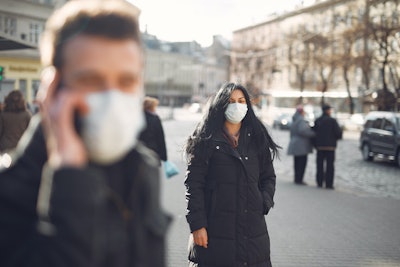
As of mid-May, less than half of U.S. consumers (48%) are concerned about their personal health, down from 57% measured during the peak in early April. Sixty percent are concerned about the health of others, down from a high of 72%. Financial concerns are not subsiding with 27% of consumers concerned about making upcoming payments, and 43% delaying large purchases. Immediate financial concern continues to spike among millennials, with 36% of 18 to 35 year olds concerned about making upcoming payments. Fear of job loss remains steady, with 37% of U.S. consumers concerned about losing their job.
Why this matters
As a global health crisis potentially morphs into an economic one, Deloitte is conducting a series of biweekly surveys around the globe to better understand the interplay between personal safety and economic vulnerability as a driver of purchase decisions and consumer behavior. Now in its third wave (fielded May 12-16), the “Deloitte Global State of the Consumer Tracker,” conducted in 15 countries, queried 1,000 consumers in each country — with insights available on an interactive dashboard. The dashboard provides insight into how consumers across the globe intend to weather this dual crisis.
Global anxiety and health concerns show signs of easing, but financial concerns remain relatively high
As economies across the world have started to open up, collective net anxiety and health concerns have also begun to ease slightly since mid-April, however financial concerns continue to linger.
Some countries like India which have seen COVID-19 hit later than other countries continue to show higher levels of anxiety, while countries that have relaxed stay-at-home orders more widely have seen anxiety lessen. Health concerns continue to be highest in China and India, the world’s two most populous countries. In the U.S., as of mid-May, less than half (48%) of consumers are concerned about their personal health (down from 57% in early April). On average, across all countries, 40% of respondents who still had a job were concerned about losing their jobs. In the U.S., 37% of respondents are concerned about losing their job. Similarly, financial concerns are not subsiding; 27% of United States consumers are concerned about making upcoming payments, and 43% are planning on delaying large purchases. Immediate financial concern continues to spike among U.S. millennials, with 36% of 18 to 35 year olds concerned about making upcoming payments.
“With regard to consumer sentiment and behavior, we are observing some early positive signals across the world which should help give confidence to business leaders as they transition from responding to this crisis to rebooting their recovery. While the next few months will be full of challenges, consumers are demonstrating that they are eager to return to some semblance of normal life — even if cautiously. This sentiment can provide a solid foundation for business recovery," says Seema Pajula, vice chairman, U.S. industries and insights leader, U.S. consumer industry leader, Deloitte LLP.
Key takeaways
- Consumer purchasing behaviors shift as health concerns begin to subside: Consumer behavior, including what consumers plan to buy, how they intend to buy it and why, continues to evolve within today’s dynamic environment. Across categories such as retail; travel and hospitality; automotive and others; significant shifts in sentiment and spending intentions are observable since the COVID-19 peak in April.
- More consumers feel safe going to the store: 42% of U.S. consumers feel safe going to the store, up significantly from 30% in April.
- In-store shopping intentions rise: The number of consumers who intend to predominantly purchase online is gradually falling, particularly in restaurants, but is also observable in categories such as apparel and electronics. For example, in early April nearly half (47%) of U.S. consumers were predominantly planning to transact with restaurants digitally in the upcoming month, but that number has recently dropped to 39%.
- Share of wallet easing: The strong spending swings initially measured during the COVID-19 peak, as consumers prioritized essentials, are no longer as pronounced. Planned cutbacks for the upcoming month around more discretionary categories such as restaurants, entertainment and travel are still present, although not as severe.
- While BOPIS intentions remain strong, fewer consumers using it because of safety: While 82% of Americans plan to “buy online pickup in store” (BOPIS) in the next four weeks, only 40% of consumers plan to use it because of safety concerns (down from 48%). Nearly one-third (32%) of consumers plan to use BOPIS to avoid delivery costs.
- Consumers stick with the brand names they trust: Across the globe, 52% of consumers indicate they will stick with the brand names they trust. In fact, consumers who are more concerned about their family’s health are more likely to purchase name brands that were struggling prior to the crisis. Interestingly, 42% of consumers report they will purchase more from brands that have responded well to the crisis.
- Impulse purchasers outnumber stockpilers: While stockpiling remained the most prevalent retail behavior measured during the study’s initial waves (53% in mid-May, down from 56% in mid-April), consumers are now more likely to make an impulse purchase if they find a great deal on a non-essential item (55% up from 48%).
- Optimistic signals for hospitality: While leisure travel plans within the summer months remain relatively low, signs of optimism are emerging. Nearly one-third of U.S. consumers (31%) plan to stay in a hotel for leisure travel within the next three months, up from a low of 24% in mid-April.
- Consumer mobility sentiment: Nearly half of U.S. vehicle owners (49%) are planning to keep their current car longer than originally expected, and 27% of current owners are delaying regular maintenance for their vehicles. At the same time, a concern for personal well-being is causing a significant percentage of people to second guess their use of public transit (60%) and ride-hailing services (57%) over the next three months.


















